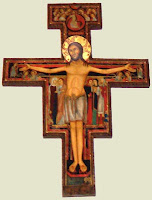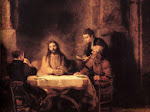 So, for example, the Eastern Orthodox Church (also known as the Orthodox Church) identifies itself as the Catholic Church. In fact, it's official name is the Orthodox Catholic Church (though the other names are more often used). (The Eastern Orthodox Church is made up of many churches - a complete list goes way beyond the scope of this posting.)
So, for example, the Eastern Orthodox Church (also known as the Orthodox Church) identifies itself as the Catholic Church. In fact, it's official name is the Orthodox Catholic Church (though the other names are more often used). (The Eastern Orthodox Church is made up of many churches - a complete list goes way beyond the scope of this posting.) |
| Coptic Icon |
The churches above are part of Eastern Christianity. In addition, two other churches that are part of Eastern Christianity are also described as Catholic Churches: the Assyrian Church of the East, and the Ancient Church of the East.
 |
| Canterbury Cathedral |
In addition, some Lutherans and some Methodists consider themselves "Catholic," especially High Church Lutherans, Lutherans who call themselves Evangelical Catholics, and Neo-Lutheranism. Some Lutheran churches part of these movements use the name Catholic in their churches. They tend to emphasize worship practices and doctrines similar to those found in the Roman Catholicism and the Anglo-Catholic portions of the Anglican Communion.
The point here is to examine the many different ways the words "Catholic" or "Catholic Church" is used in many different traditions.
On to Part 3
Back to Part 1
Back to Intro




